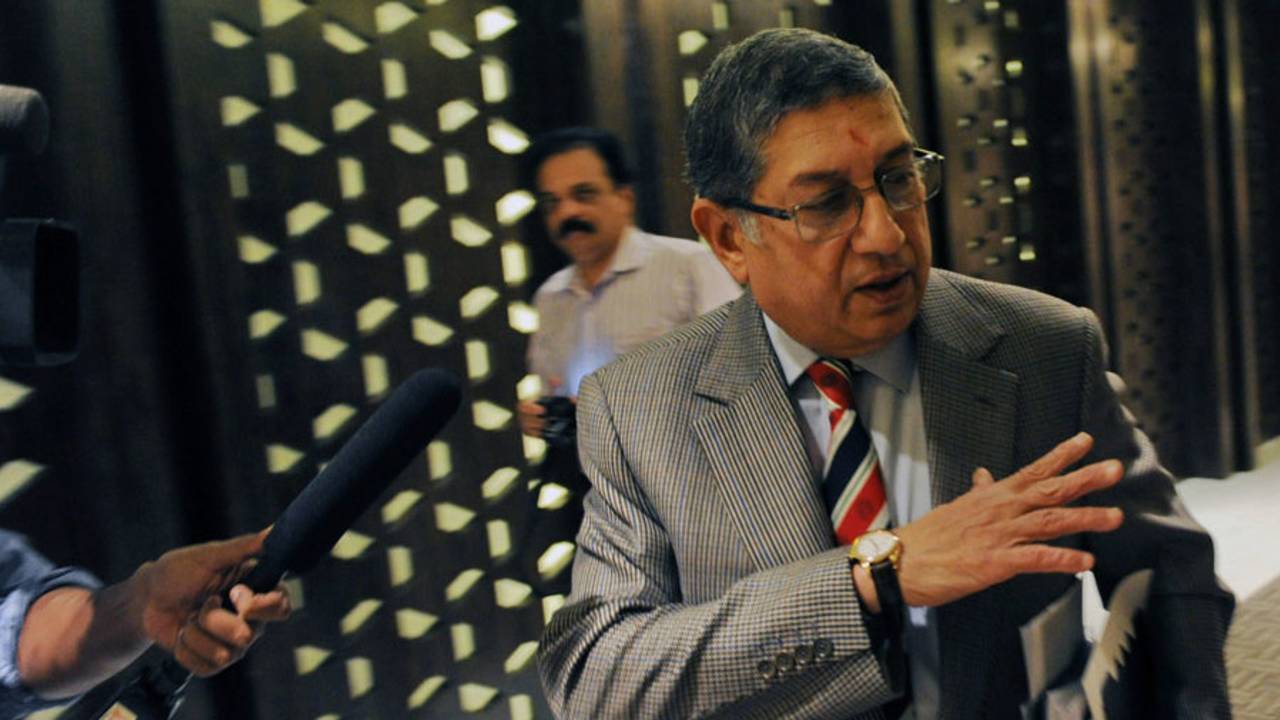Court strikes down controversial BCCI clause
The Supreme Court struck down the controversial amendment to the BCCI constitution's clause 6.2.4 that allowed board officials to have a commercial interest in the IPL and the Champions League T20
ESPNcricinfo staff
22-Jan-2015
The BCCI rule was said to have "authorised" the "creation and continuance" of a conflict-of-interest situation • AFP
For the first time in its history, the BCCI's constitution was amended by an order from an external agency, in this case the country's highest court. The Supreme Court in its judgement pertaining to the 2013 IPL corruption case struck down the controversial amendment to the BCCI constitution's clause 6.2.4 that allowed board officials to have a commercial interest in the IPL and the Champions League T20.
The rule was declared "void and ineffective", "unsustainable and impermissible in law" as it was said to have "authorised" the "creation and continuance" of a conflict-of-interest situation. The two-man bench of Justice TS Thakur and Justice FMI Kalifullah said the amendment of the rule was the "true villain" in the situation at hand and had perpetuated the conflict. The rule was amended in September 2008, six months after the Chennai franchise was sold to the-then BCCI secretary N Srinivasan's India Cements.
The court stated in its order that the amendment had led to "three real life situations" of conflict of interest due to Srinivasan's dual roles. "Between the duty which Mr Srinivasan owes to BCCI… his commercial if not personal interest in the events which the BCCI organises."
In a detailed segment of its 138-page order, the court listed the incidents as follows:
The BCCI awarded compensation of Rs 10.4 crores to Chennai Super Kings on the cancellation of the CLT20 of 2008 following the 26/11 Mumbai attacks. The court said that regardless of the fact that Rajasthan Royals were also recipients of the same amount of money, Srinivasan was at the time "privy to a self-serving decision that benefited India Cements Ltd, a company promoted by Mr. Srinivasan."
The argument that there were other members of the CLT20 governing council participating in the decision-making process, the court said, "does not cure the legal flaw arising out of the benefactor also being the beneficiary of the decision."
The court said that all that a situation of conflict of interest requires is a "reasonable likelihood of bias." It said that "the test is not whether bias was actually at work when the decision was taken. It is a reasonable likelihood of bias that determines whether the action can be faulted."
The second situation pertained to an award of Rs 13.10 crores, a higher amount pertaining to the same cancellation of the 2008 CLT20 against unaudited claims of loss by Super Kings and Royals. The amount was returned by Super Kings to the board, but the court said that there was no certainty whether the return of the funds came because of public pressure on Srinivasan or recognition of the fact that his team was not really due the amount after it had been paid to the actual financial detriment of the BCCI.
The third instance of conflict of interest, where "Mr Srinivasan's commercial interest came in direct conflict with his duty as president of BCCI" is when "allegations of betting were levelled against his son-in-law." The court said that regardless of whether Srinivasan had attempted to cover up Gurunath Meiyappan's betting racket or not, his denial about his role as an official had taken place at a time when it was known that misconduct on the part of officials could lead to punishment for both the individuals involved and the franchises as well.
"A clear conflict of interest had arisen between what is Mr Srinivasan's duty as a president of BCCI on the one hand and his interest as father-in-law and owner of team CSK on the other."
The argument offered by Srinivasan's counsel that along with his family he owned only 0.14% equity in India Cements Ltd was also found as "misleading." The court had found "from the record" that Srinivasan's family "directly and indirectly holds 29.23% of the equity in ICL" with his wife, daughter and himself being directors on its board.
Citing these examples the court stated that clause 6.2.4 was "illegal" because it "permits, protects and even perpetuates situations where the Administrators can have commercial interests in breach or conflict with the duty they owe to the BCCI or to the people at large."
It remarked that this was in direct contravention of the BCCI's own anti-corruption code, as the Rule 6.2.4 "clearly negates" the board's original intentions "by permitting situations in which conflict of interest would grossly erode the confidence of the people in the authenticity, purity and integrity of the game."
The Supreme Court-appointed Justice Mukul Mudgal commission which had investigated the 2013 IPL corruption case in two phases had a specific ambit which did not involve conflict of interest. After it filed its final report in November 2014, the two-man bench extended the ambit of the case to question the conflict of interest and Srinivasan's role in it. The result of that expansion of the case by Justices Thakur and Kalifullah has now led to the BCCI's rules being struck down and its constitution being put under the scanner by an independent commission.
